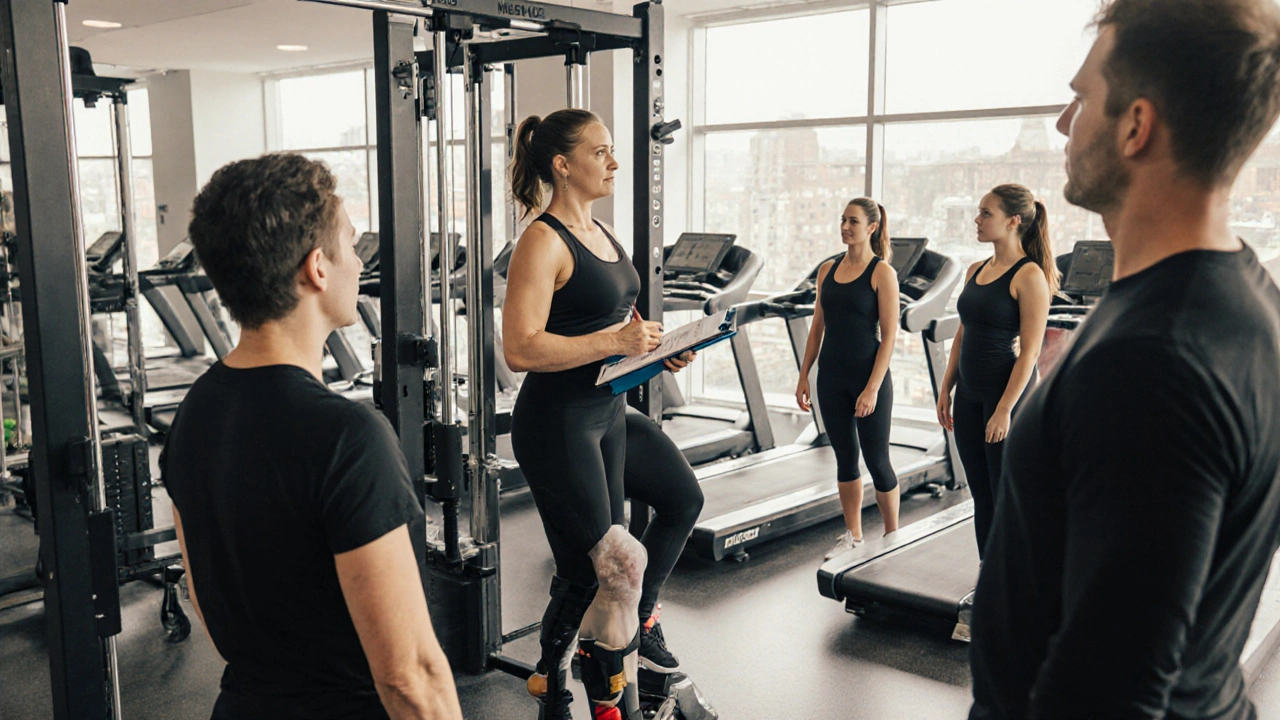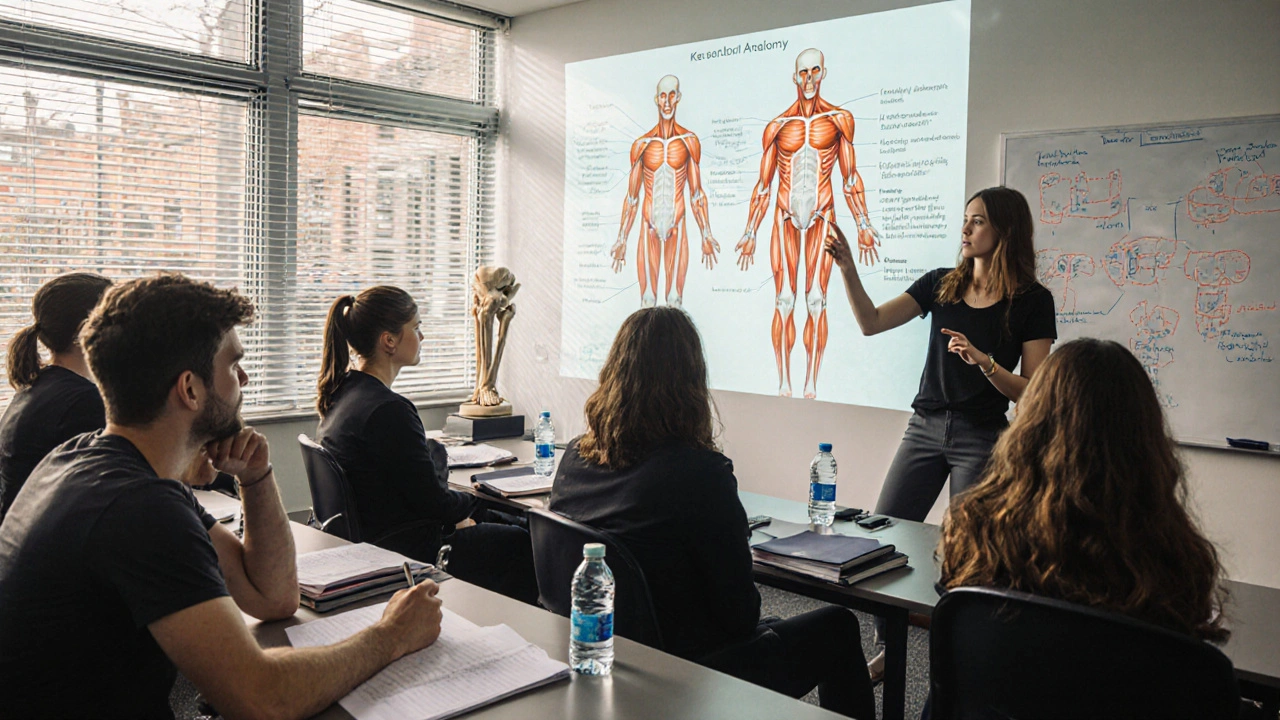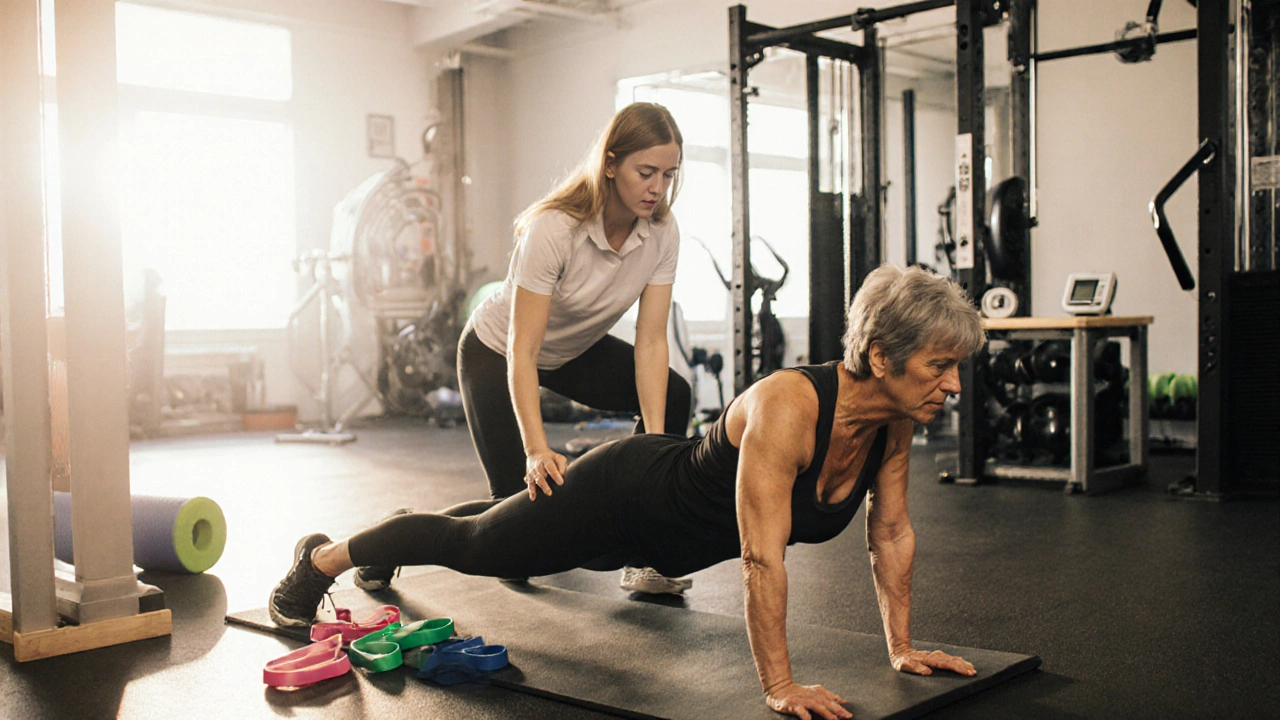
Want to become a certified fitness instructor in London? It’s not just about working out. It’s about learning how to keep people safe, motivated, and progressing-while passing a real exam that’s taken seriously by gyms across the city. If you’re thinking of turning your passion for fitness into a career, you need to know what’s actually required. No fluff. No hype. Just what you’ll do, what you’ll study, and what you’ll face when it’s time to be tested.
What Does a Certified Fitness Instructor Actually Do?
A fitness instructor in London doesn’t just lead group classes or spot someone on the bench press. They assess clients’ movement, design safe workout plans, adapt exercises for injuries or limitations, and know when to refer someone to a physiotherapist. Most work in commercial gyms like PureGym, Anytime Fitness, or local studios in Clapham, Camden, or Stratford. Employers don’t just want someone who can do a perfect squat-they want someone who understands anatomy, knows how to communicate with beginners, and can handle emergencies.
The certification you earn needs to prove you can do all that. The most recognized qualification in the UK is the Level 2 Gym Instructor and Level 3 Personal Trainer certifications from awarding bodies like Active IQ, YMCA Awards, or City & Guilds. These aren’t online certificates you buy in 20 minutes. They’re regulated by Ofqual and require hands-on training, written exams, and practical assessments.
Training: What You’ll Actually Do
Most full-time courses in London run between 4 to 12 weeks. Part-time options stretch out to 3-6 months. You won’t spend all day lifting weights. Here’s what your schedule usually looks like:
- Human anatomy and physiology-bones, muscles, how the heart works during exercise
- Exercise programming-how to structure sessions for weight loss, strength, endurance
- Client communication and motivation-learning how to talk to someone who’s never set foot in a gym
- Health screening-how to spot red flags like high blood pressure or dizziness before a workout
- Practical sessions-teaching real people on treadmills, resistance machines, and floor exercises
Training isn’t just lectures. You’ll be on your feet, practicing how to cue someone to engage their core, correct their posture on a leg press, or modify a plank for a client with lower back pain. Many courses include real client sessions where you’ll be observed by assessors. If you can’t explain why you’re asking someone to tuck their pelvis during a glute bridge, you won’t pass.
Some providers offer blended learning-online theory plus weekend practical blocks. But if you’re serious about getting hired, choose a course with daily in-person training. London gyms know the difference between someone who watched videos and someone who’s practiced correcting form in front of a live client.
Exams: What You’ll Face
The exam isn’t one test. It’s a mix of written, practical, and sometimes oral components.
Written exam: Usually 60-80 multiple-choice and short-answer questions. Topics include muscle actions, exercise safety, nutrition basics, and legal responsibilities. You need at least 70% to pass. No guessing your way through this. You’ll need to know the difference between concentric and eccentric contractions, or what the ACSM guidelines say about exercise frequency for beginners.
Practical assessment: You’ll be given a client profile-say, a 55-year-old woman with knee osteoarthritis-and asked to design and deliver a 30-minute session. Assessors watch your communication, your cueing, your safety checks, and how you adapt exercises on the fly. One candidate failed because she didn’t check if the client had taken their blood pressure medication that morning. That’s the level of detail they look for.
Portfolio or case study: Some courses require you to log a few client sessions, write reflections, and show how you adjusted programming based on feedback. It’s not busywork-it’s proof you can think beyond a script.
Most people fail the first time-not because they’re unfit, but because they underestimate the theory. You don’t need to be a bodybuilder. You need to understand how the body works.

Where to Train in London
There are dozens of providers, but not all are equal. Stick to those accredited by Ofqual and recognized by REPs (Register of Exercise Professionals). Here are a few reputable options:
- London Fitness Academy (Battersea)-intensive 6-week course with guaranteed placement interviews
- Active IQ London (multiple centers)-flexible scheduling, widely accepted by gym chains
- Yorkshire Fitness Training (London campus)-strong focus on injury prevention and rehabilitation
- PT Distinction (Hackney)-small class sizes, personalized feedback
Avoid any course that promises certification in under two weeks or doesn’t mention Ofqual or REPs. If the website looks like a template from 2012 and the price is under £500, it’s probably not worth the paper it’s printed on. Most quality courses cost between £1,200 and £2,500. That includes textbooks, exam fees, and access to gym facilities for practice.
What Comes After Certification
Getting certified is step one. Getting hired is step two. London gyms get hundreds of applications. What sets you apart?
- Specialize. Learn how to train postnatal clients, older adults, or people with diabetes. Few instructors do this well-and gyms pay more for it.
- Get CPR/First Aid certified. It’s not always required, but 9 out of 10 employers prefer it.
- Build a simple portfolio. Take before-and-after photos (with permission), write short client success stories, record yourself teaching a 2-minute clip.
- Network. Go to local fitness expos, join London Fitness Network meetups, volunteer at community health events.
Entry-level fitness instructors in London earn between £18 and £25 per hour. Those with niche skills or who work in premium studios like The Gym Group or David Lloyd can earn £35+ per hour. Freelancers who build their own client base often make more-but that takes time.

Common Mistakes to Avoid
People think fitness certification is about looking fit. It’s not. Here’s what trips most people up:
- Skipping the anatomy study-thinking they’ll learn it on the job
- Practicing only on friends who are already fit-never working with beginners or injured clients
- Not asking enough questions during training-assuming the instructor knows what they’re doing
- Choosing the cheapest course without checking accreditation
- Waiting until after the exam to start applying for jobs
One student I spoke to passed her exam but couldn’t get hired because she had never taught a session to someone over 60. She’d only trained athletes. The gym hired someone else-someone who’d volunteered at a senior center during her course.
Is This Career Right for You?
It’s physically demanding. You’ll be on your feet 6-8 hours a day. You’ll deal with people who are frustrated, tired, or self-conscious. You’ll work weekends and holidays. But if you love helping people find strength they didn’t know they had-if you enjoy seeing someone walk up stairs without pain after three months of training-then it’s worth it.
The fitness industry in London is growing. More people are joining gyms. More employers are looking for qualified instructors. The barrier to entry isn’t your body. It’s your knowledge. And with the right training, you can cross it.
How long does it take to get certified as a fitness instructor in London?
Most full-time courses take 4 to 12 weeks, depending on the intensity and whether you’re doing Level 2 only or Level 2 plus Level 3. Part-time options can stretch to 3-6 months. You’ll need to complete both theory and practical assessments before receiving your certification.
Do I need a degree to become a fitness instructor in London?
No, you don’t need a degree. The industry standard is a Level 2 Gym Instructor qualification and often a Level 3 Personal Trainer certification, both awarded by Ofqual-regulated bodies like Active IQ or City & Guilds. These are vocational qualifications, not academic degrees.
How much does fitness instructor certification cost in London?
Expect to pay between £1,200 and £2,500 for a full certification package that includes training, materials, and exam fees. Cheaper options exist but often lack accreditation or hands-on practice. Always verify the awarding body is recognized by REPs and Ofqual.
Can I work as a fitness instructor without certification in London?
Technically yes, but most commercial gyms require certified instructors. Without certification, you won’t be insured to train clients, and most employers won’t hire you. Insurance providers like Fitness Industry Association (FIA) require proof of accredited qualifications.
What’s the difference between a gym instructor and a personal trainer?
A Level 2 Gym Instructor can lead group classes and guide clients on gym equipment under supervision. A Level 3 Personal Trainer can design one-on-one programs, assess clients’ fitness levels, and work independently. Most people start with Level 2 and then upgrade to Level 3.
Is CPR certification required for fitness instructors in London?
It’s not always mandatory, but nearly all employers prefer or require it. Many training providers bundle it into their courses. Having CPR and AED certification makes you a more attractive candidate and increases your liability coverage.
Next Steps
Start by visiting the REPs website and checking which qualifications are currently registered. Then, contact three providers in London and ask: “Can I observe a class?” “What’s your pass rate?” “Do you offer job placement support?” Don’t just pick the cheapest. Pick the one that prepares you for real clients, not just exams.
Book your course, show up every day, ask questions, and practice with people who aren’t your fit friends. The gym floor doesn’t care how toned you are. It only cares if you know what you’re doing-and that’s something no Instagram post can teach you.